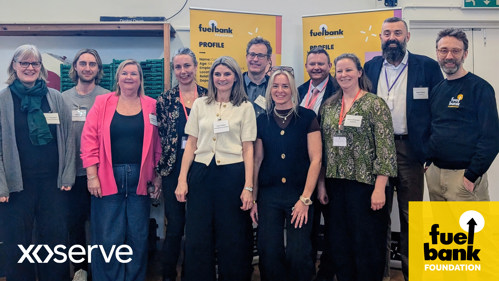7 April 2025
Widening the lens
Twelve months on from our first award-winning energy event, Xoserve once again partnered with the Fuel Bank Foundation for ‘Fuel Crisis: Data-Driven Strategies for Inclusive Change’.
This year, we wanted to widen the lens to include more utilities sectors, bringing together leading voices from Ofgem, DESNZ, Energy UK and Ofwat, alongside representatives in the banking and consumer support sectors.
The aim? To discuss how data sharing between sectors can drive inclusive change for those in need of support. Our CEO, Steve Brittan, and Matt Cole, founder of the Fuel Bank Foundation, begin the day by reminding us of the harsh realities of poverty, destitution, and crisis. The themes Charles Dickens depicted in Oliver Twist, set just around the corner from where the event was held in London, are, unfortunately, still relevant today.
Gathering industry leaders
The event kicked off with the Fuel Bank Foundation immersing attendees in the everyday challenges faced by those in fuel crisis, bringing back the personas, based on real users of the Fuel Bank Foundation, from our initial event. The morning session was designed to get everyone thinking about the physical, mental and emotional impact of living in fuel crisis could have on their persona.
This was followed by a panel discussion with representatives from the energy, water, and banking sectors, sharing practical insights, what's working in their sectors, where the challenges are, and how we can all learn from each other.
Chair: Steve Brittan, Xoserve
Panel speakers:
- Juliette Sanders, Energy UK
- Chris Fitch, Money Advice Trust
- Andrew White, Consumer Council for Water
Some of the key themes from Juliette and Andrew included the use of innovation to better support customers, including AI, as well as comprehensive and automatic data sharing with a tell us once process that links across all utility sectors.
"Every year, we [Energy UK] produce a good practice report so that suppliers can learn from each other about how they can best support customers. What we've seen in the last couple of years is great innovative use of technology within that space, with a lot of suppliers using AI."
Juliette Sanders, Energy UK
Chris also stressed the importance of a needs-based approach to data sharing, emphasising that:
"The question isn't what’s making people vulnerable, it's what are people vulnerable to? Once this has been solved, industries can then answer how best to support them, and if it's not us, then who? Giving customers a forward direction rather than a barrier."
Chris Fitch, Money Advice Trust
By the afternoon, our guests were ready to tackle the final session, where groups discussed ideas, challenges, and opportunities for effectively sharing customer information and developing enhanced tailored support for those in fuel crisis.
The conversation focused on what the utilities sector needs to change to achieve improved customer outcomes by applying lessons learned from other sectors.
Set in the heart of the community
Last year we held our event at Xoserve’s offices, in the West Midlands, an area that has the highest levels of fuel poverty in the country. This time, the event was held even closer to the realities of fuel crisis, the Queensborough Community Centre in Southwark, London. This community centre is just one of the 800 venues partnering with the Fuel Bank Foundation to offer energy support to its visitors.
The heart of the day came from attendees spending time with Tash and Michelle, who volunteer at Queensborough Community Centre, who shared snippets of the lives of the individuals who use the centre.
We heard about people forced to make an impossible choice: eat a hot meal or warm their home. It's a dilemma we touched upon at last year's event, ‘The price of warmth,’ and the difference a charity organisation such as the Fuel Bank Foundation can make, as well as the gaps between customers and their suppliers.
One of the recurring themes was the lack of trust in utility suppliers, with many feeling more comfortable turning to people they knew, like the team at the community centre, or Citizens' Advice. Despite supplier initiatives in place to help those struggling with bills, one key theme was one of disengagement between customers and suppliers.
Key takeaways and a path forward
The real-life experiences shared by Tash and Michelle, coupled with the powerful case studies behind the six personas, brought the harsh reality of living in fuel crisis to the surface.
However, it wasn’t just about highlighting the problems, it was about setting the stage for how the utilities sector can collaborate on data-driven strategies for an improved experience for customers needing extra support. Whether that’s rethinking the Priority Services Register, exploring regulated social tariffs, and building stronger data links between government, finance, health, and utilities.
We have collated the output from our afternoon discussions into a report which you can read and download below.
The message from the day was clear: collaboration is essential, avoiding broad assumptions, and adopting a new approach to customer and supplier communications are fundamental if we hope to end the fuel crisis.
Thank you to the team at the Fuel Bank Foundation for bringing to life the realities of fuel crisis into focus.

Get in touch
If you have any feedback or questions on any of the above, or would like to know more about vulnerability or data, please email us at communications@xoserve.com.
Share this news article
